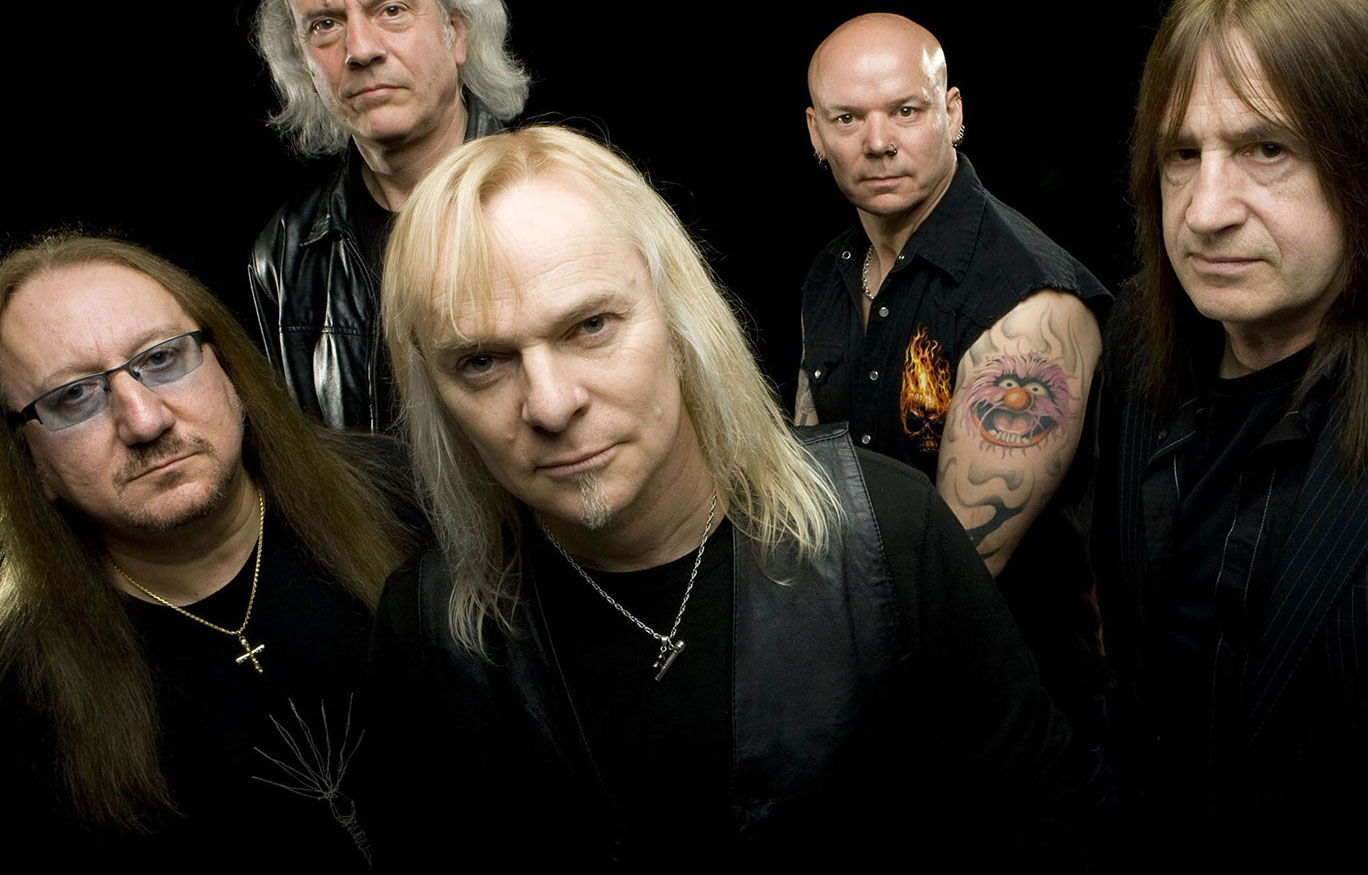NEW YEAR’S EVE
IN ROMANIA
31. DEZEMBER 2016
SIBIU
ROMANIA
MARKETPLACE
OPEN AIR
FREE ENTRANCE!!

Uriah Heep are an English rock band formed in London in 1969. Twelve of the band’s albums have made it to the UK Albums Chart (Return to Fantasy reached No. 7 in 1975) while of the fifteen Billboard 200 Uriah Heep albums Demons and Wizards was the most successful (#23, 1972).[1] In the late 1970s the band had massive success in Germany, where the „Lady in Black“ single was a big hit.[2][3] Along with Led Zeppelin, Black Sabbath and Deep Purple, Uriah Heep had become one of the top rock bands in the early 1970s.[4]
Uriah Heep’s audience declined by the 1980s, to the point where they became essentially a cult band in the United Kingdom and United States. The band maintains a significant following and performs at arena-sized venues in the Balkans, Germany, Japan, the Netherlands, Russia and Scandinavia. They have sold over 40 million albums worldwide with over 4 million sales in the U.S,[5] where their best-known songs include Easy Livin‘, The Wizard, Sweet Lorraine, and Stealin‘.
The band’s origins go back to 1967 when 19-year-old guitarist Mick Box formed a band in Brentwood called Hogwash, which began playing in local clubs and pubs. When the band’s singer left, drummer Roger Penlington suggested his cousin David Garrick (who knew the band) as a replacement. Box and Garrick instantly formed a songwriting partnership and, having higher musical aspirations than their colleagues, decided to give up their day jobs and go professional. They set up a new band called Spice; it was then that David Garrick changed his surname to Byron. Drummer Alex Napier (born 1947 in Glasgow, Strathclyde, Scotland) joined, having answered a music paper ad and bassist Paul Newton of The Gods completed the line-up.[6]
The lineup remained unchanged from 1986 until 2007, being veteran Mick Box at the helm, Trevor Bolder on bass, Lee Kerslake on drums, vocalist Bernie Shaw and Phil Lanzon on keyboards. Their principal tour circuit has been in Germany, the Netherlands, Scandinavia, Japan and Russia. In December 1987 they were one of the first ever Western bands to play in Soviet Russia (UB40 were the first in 1986), under Mikhail Gorbachev’s policy of glasnost.[33] At Moscow’s Olympic Stadium the band played ten consecutive nights to a total of 180,000 people (following a reception that Bernie Shaw remembered as being „something like Beatlemania“), which was represented in the international press as not just an achievement for Uriah Heep but a major breakthrough for Western music in general. The concerts were recorded and issued as the Live in Moscow album, which included three new tracks. Ironically, it was this behind the Iron Curtain excursion that did well to re-establish Heep’s name back at home. After a series of sell-out dates in Czechoslovakia, East Berlin and Bulgaria the band returned to Britain for the Reading Festival in August 1988, and toured the UK with The Dogs D’Amour. Raging Silence, produced by Richard Dodd and released in May 1989, was followed by a return to the Soviet Union, concerts in Poland, East Berlin, six dates in Brazil and another British tour. „The last two years have been the most enjoyable of all my time in Heep,“ Trevor Bolder was quoted to say at the time. The band played in the Central TV studios in Nottingham (the film was shown as part of the Independent TV series Bedrock and a few years later it was repeated in the Cue Music series) and celebrated its 20th Anniversary with a series of compilations and re-issues.[32]
In early 2007, drummer Lee Kerslake had to leave the group due to ill health. In March of that year the band recruited Russell Gilbrook as their new drummer and immediately started recording a new studio album entitled Wake the Sleeper, where they used double drums in the songs Wake the Sleeperand War Child. Originally slated for a summer 2007 release, Universal Music finally released Wake the Sleeper on 2 June 2008. In October 2009 Uriah Heep released their 40th Anniversary Celebration album, containing new studio recordings of twelve of their best known tracks, plus two brand new songs.[39] „This collection underlines again that Uriah Heep are deserving great respect for their past achievements but far more importantly it makes it crystal clear that this is a band with a bright future as well as a glorious history,“ wrote Chris Kee in his 9/10 review in Powerplay magazine’s February 2010 issue.[39] A United States tour for June/July 2010 was delayed due to immigration problems; the first two dates had to be rescheduled. This resulted in an appearance at B.B. King’s in New York City as being the first date of the tour. Then Uriah Heep performed live on the Progressive Rock stage at the inaugural High Voltage Festival in London’s Victoria Park on 25 July 2010. They played their 1972 album Demons and Wizards in its entirety, being joined by ex-Whitesnake man Micky Moody on slide guitar.[40]
Uriah Heep’s music has predominately been described by critics and journalists as heavy metal.[45][46][47][48][49][50][51] The band’s style has also been labeled as progressive metal,[52] and the band as being influenced by the styles heavy metal, progressive rock and blues.[53] Uriah Heep’s distinctive features have always included a massive keyboard sound, strong vocal harmonies and (in the early years) David Byron’s quasi-operatic vocals.[15][54]